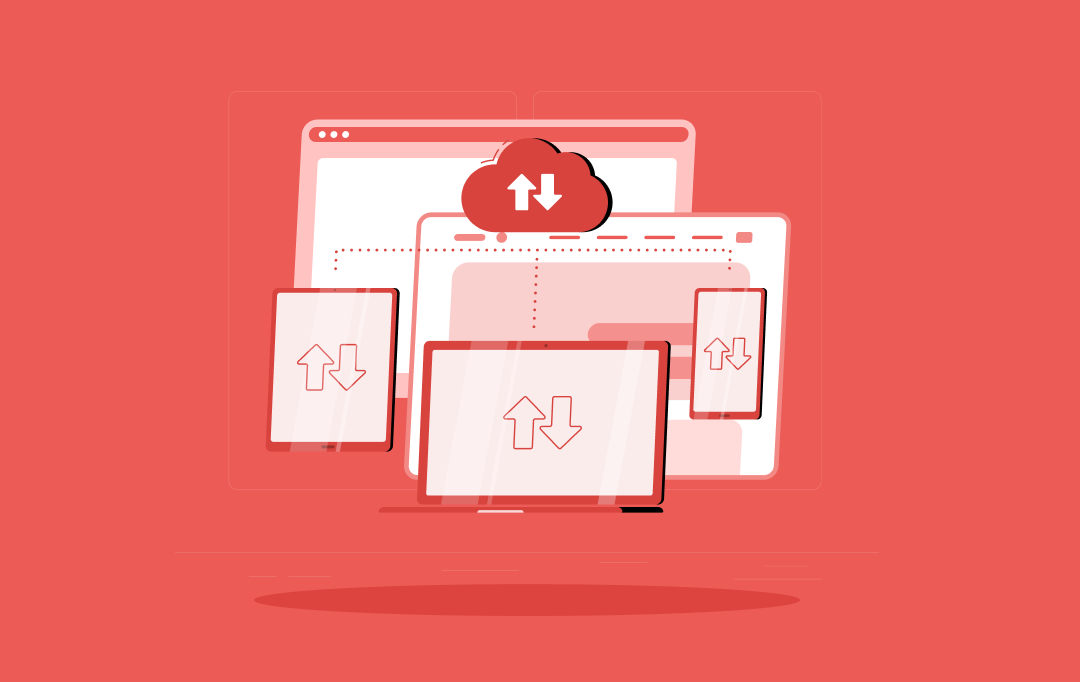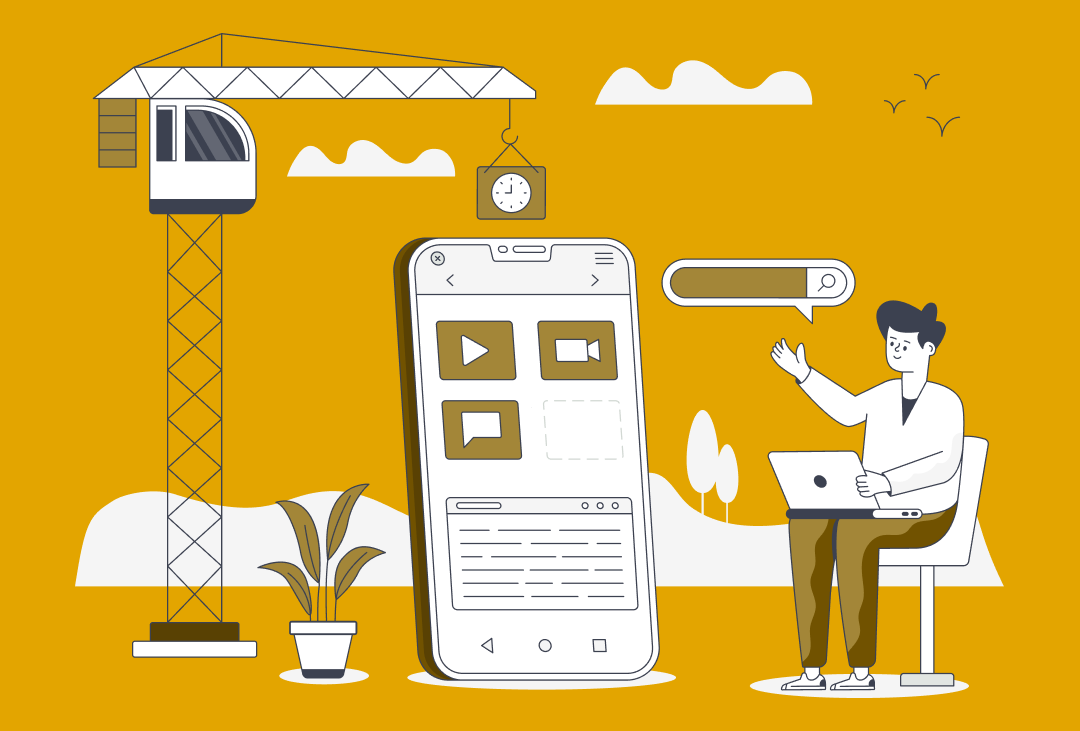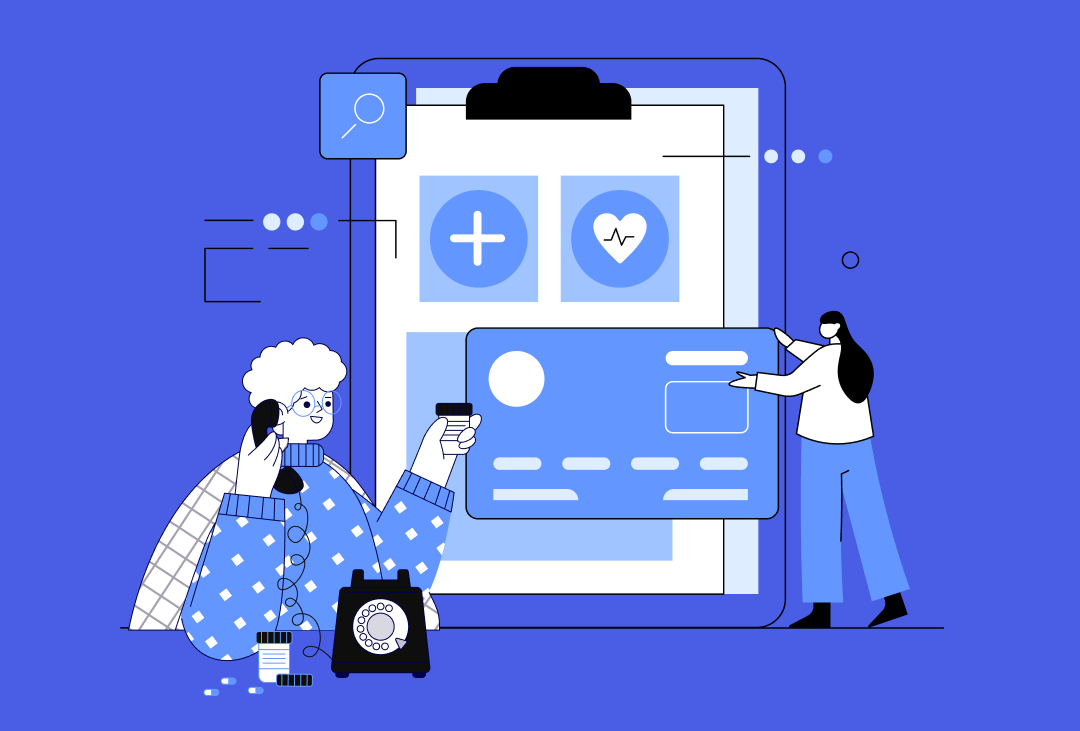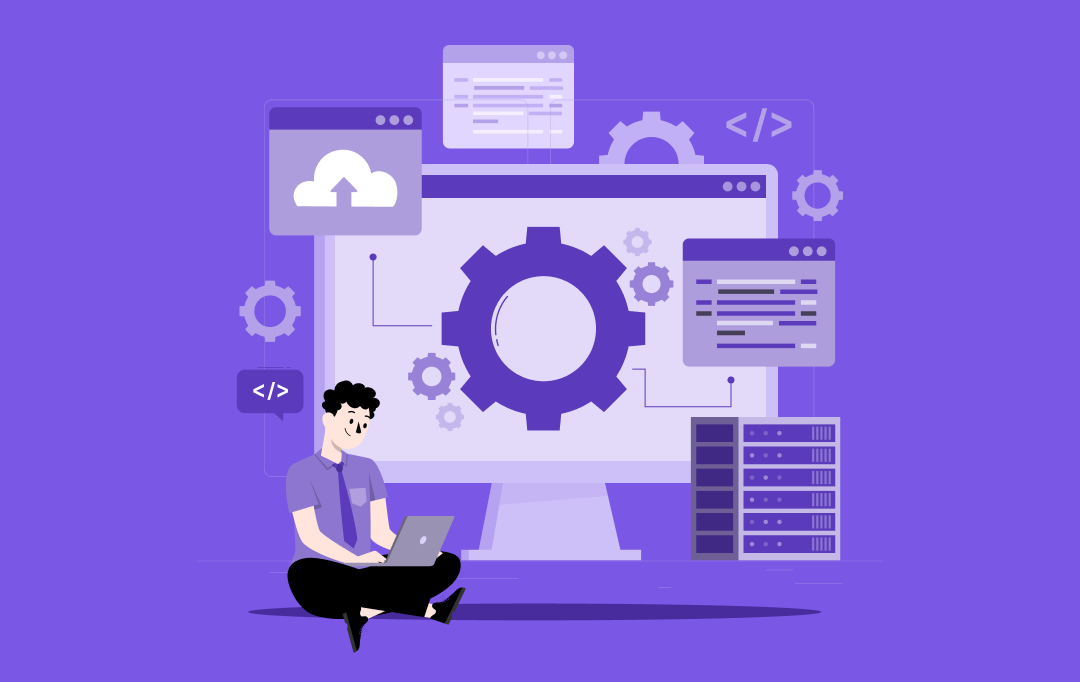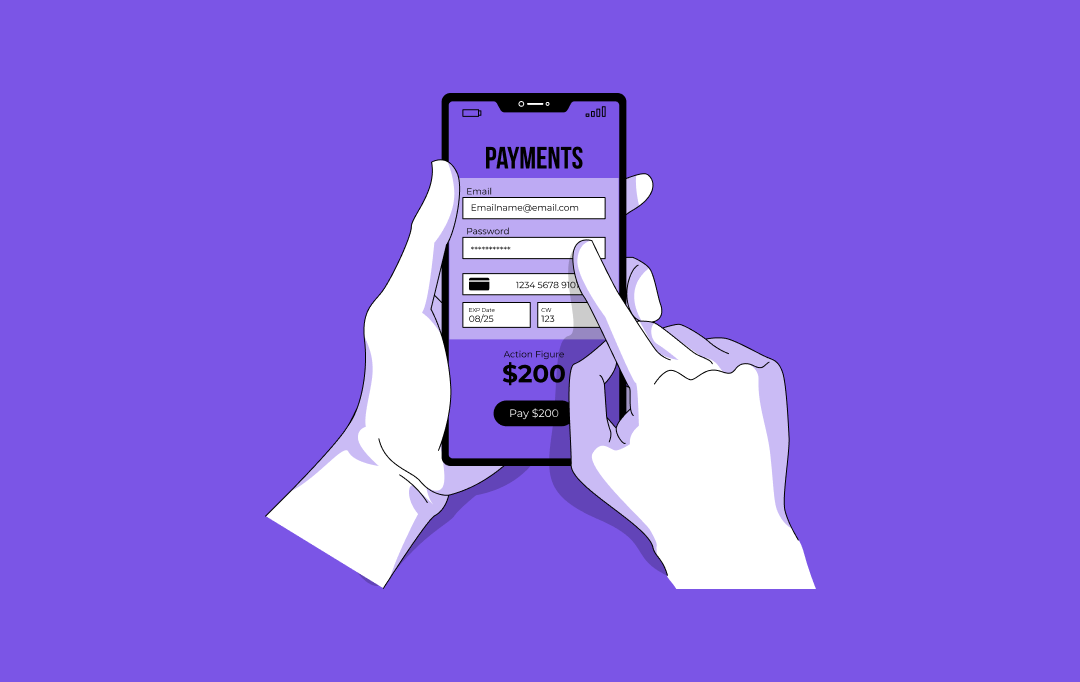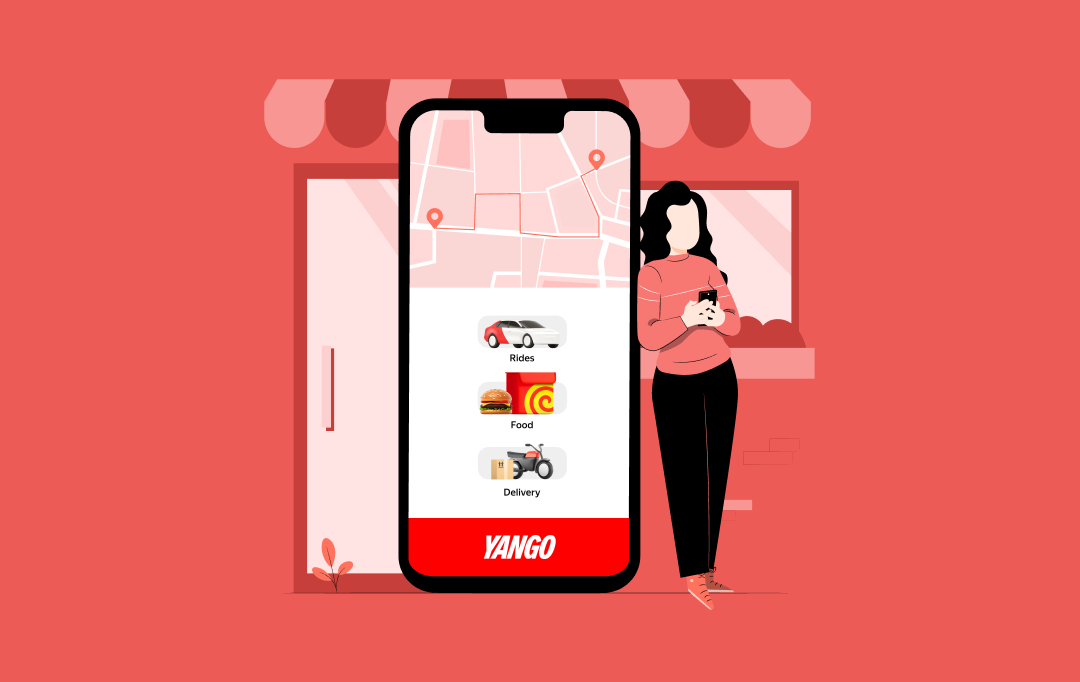For businesses in Germany, custom mobile apps are more than just tools—they’re key drivers of efficiency, brand presence, and growth. If your company in Germany is about to embark on a custom mobile app project, one question will linger: “How much will it cost to develop our app?”
Let’s explore the factors that shape this cost, from regional tech talent availability to technological infrastructure, and how you can ensure your budget delivers real value and impact.
No more talks; let’s move towards knowing the cost factors, monetization model, and best development approach. We’ll also explore key design considerations and essential features that can set your app apart. Get ready to uncover actionable insights that will drive your app’s success.
How Much Does it Cost to Build A Mobile App in Germany?
The development costs for such an app depend on various factors, including the complexity of features, the integration of cutting-edge technologies, UI/UX design requirements, and the expertise level of the development team.
Typically, the cost to develop a customized mobile app in Germany ranges between $40,000 and $300,000 (approximately €37,000 to €280,000), offering businesses tailored solutions to meet their specific needs while adhering to high-quality standards.
| App Complexity Levels |
Features |
Duration |
| Basic
($40,000 to $60,000) |
1. Simple UI
2. Basic Navigation
3. Limited Functionality
4. Standard Security Measures
5. Basic Database Integration
6. Essential Push Notifications
7. Single Platform Compatibility (iOS or Android) |
2 to 4 months |
| Moderate
($60,000 to $120,000) |
1. Enhanced UI
2. Improved Navigation Experience
3. Expanded Functionality
4. Enhanced Security Features
5. Integration with External APIs
6. Basic Offline Functionality
7. Cross-Platform Compatibility
8. Social Media Integration |
4 to 6 months |
| Complex
($120,000 to $300,000) |
1. Highly Polished UI/UX Design
2. Advanced Navigation Features
3. Rich Functionality with Custom Features
4. Robust Security Protocols
5. Seamless Third-party Integrations
6. Advanced Offline Capabilities
7. Real-time Updates
8. Advanced Analytics and Reporting
9. Multi-language Support
10. Cross-Device Compatibility |
6 to 9 months |
Factors Influencing Mobile App Development Cost in Germany
Several crucial factors influence the process of building a mobile app in Germany. These elements play a vital role in shaping the app’s functionality and user experience, directly affecting the overall cost to build an app in Germany. Let’s take a closer look at these factors!
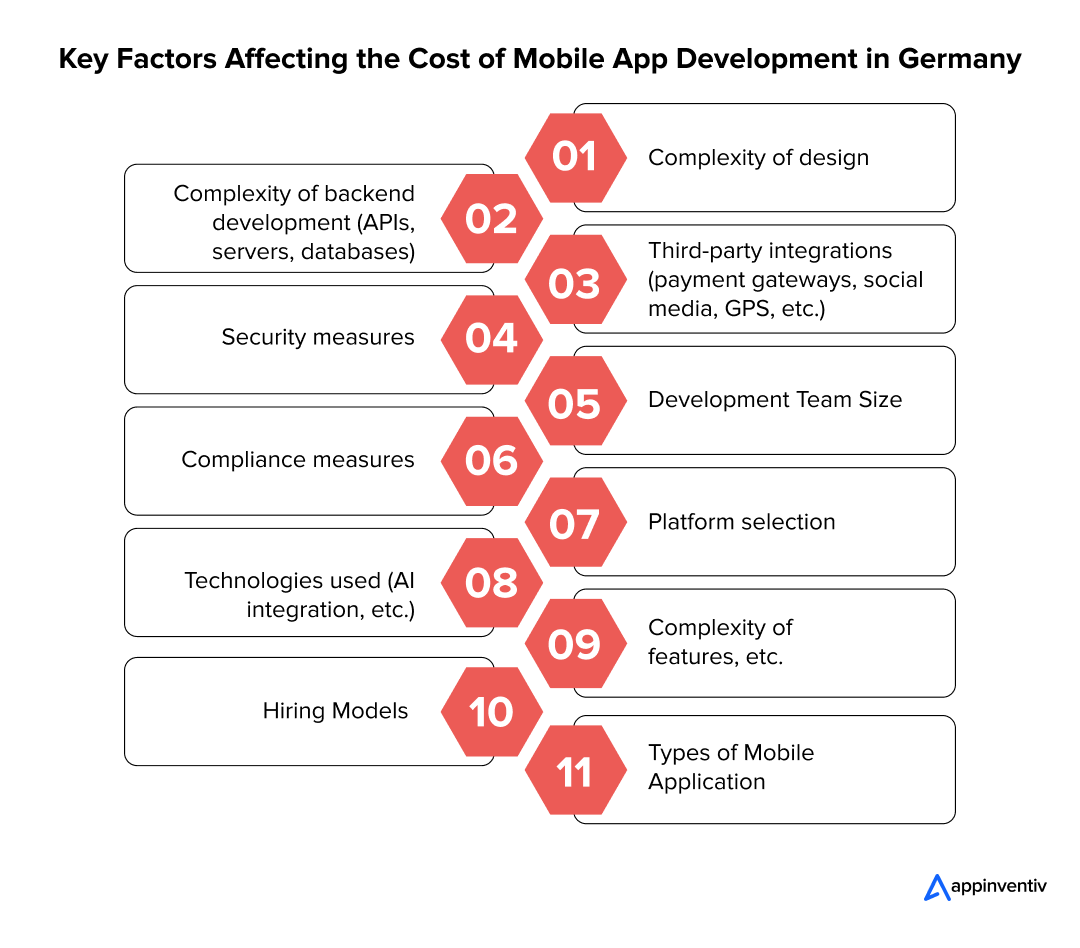
Complexity of Design
The design of an app significantly impacts its development cost. Simple designs with basic layouts are less expensive, while intricate designs with custom animations, transitions, and visually rich interfaces require more time and skilled resources.
Crafting a user-friendly and aesthetically appealing interface also involves extensive testing to ensure seamless navigation. These additional efforts drive up the overall cost to build an app in Germany.
Cost Comparison Based on Design Complexity
| Design Complexity |
Estimated Cost |
| Basic UI/UX Design |
$6,000 – $30,000 |
| Custom/Advanced UI/UX Design |
$30,000 – $50,000+ |
Complexity of Backend Development
A robust backend is essential for managing app functionalities like data storage, user authentication, and API integration. Apps that require complex server-side logic, real-time data processing, or scalable architectures demand significant investment.
Custom database design and advanced server configurations further enhance cost to build an app in Germany due to the need for skilled German backend developers and extended development time.
Third-Party Integrations
Integrating third-party tools such as payment gateways, GPS systems, and social media platforms increases the development time and cost to build an app in Germany. Each integration requires compatibility testing, license procurement, and API customization to meet the app’s needs. Moreover, maintaining these integrations over time adds to the long-term expenditure, especially if updates or new features are introduced.
Cost Comparison Based on Third-Party Integrations
| Third-Party Integration |
Estimated Cost |
| Basic Integration (Single Payment Gateway) |
$2,000 – $10,000 |
| Complex Integration (GPS, Multiple APIs, Real-Time Analytics) |
$5,000 – $15,000+ |
Security Measures
With Germany being a global leader in data privacy, apps developed for this market must adhere to stringent security standards. Incorporating GDPR-compliant features, advanced encryption, and secure data storage increases development time and costs. Frequent audits and updates to counter emerging threats also add to long-term expenses.
Cost Comparison Based on Security Measures
| Security |
Estimated Cost |
| Basic Security Measures (SSL, Data Encryption) |
$5,000 – $8,000 |
| Advanced (Biometrics, Multi-Factor Authentication, Encryption) |
$15,000 – $100,000+ |
Development Team Size
The Development Team Size significantly impacts the cost of mobile app development in Germany. A larger team, including German app developers, designers, QA testers, and project managers, ensures faster delivery and higher quality but comes with higher expenses. A smaller, focused team may reduce costs but can extend project timelines and limit specialized expertise.
| App Development Team |
Hourly Rates (Approx) |
| Project Manager |
$25 to $30 |
| Tech Lead (Backend / Frontend) |
$28 to $30 |
| Sr. Mobile App Developer |
$25 to $30 |
| Sr. Web & Backend Developer |
$24 to $30 |
| DevOps |
$25 to $30 |
| Business Analyst |
$20 to $25 |
| UX/UI |
$20 to $25 |
| QA |
$20 to $25 |
Compliance Measures
Adhering to Germany’s stringent regulations, such as GDPR, necessitates additional development and legal costs. When you hire an app developer, ensure the app handles data securely, allows user consent, and provides data access and deletion rights. This requires expert consultation, specialized tools, and meticulous coding, all of which add to the overall cost to build an app in Germany.
Platform Selection
Deciding between iOS, Android, or both platforms affects the development cost significantly. Native apps offer better performance and require separate codebases for each platform, resulting in higher costs. Alternatively, cross-platform development can reduce costs but may involve trade-offs in performance and customization.
Cost Comparison Based on Platform Choice
| Platform |
Estimated Cost |
| Single Platform (iOS or Android) |
$30,000 – $100,000 |
| Cross-Platform (iOS and Android) |
$100,000 – $300,000+ |
Technologies
Germany’s tech-savvy users expect apps to leverage advanced technologies like AI, AR/VR, and IoT. For instance, AI-driven chatbots for customer support or IoT-enabled apps require specialized expertise and infrastructure, leading to higher development costs. Adopting cutting-edge technologies is often essential to staying competitive in the German market and enhancing the cost to build an app in Germany.
Cost Comparison Based on Tech Stack
- Basic Tech Stack (React Native, Flutter, PHP): $50,000 – $120,000
- Advanced Tech Stack (Python, AI, Blockchain): $120,000 – $250,000+
| Technology |
Influence on Development Costs |
Explanation |
| Artificial Intelligence (AI) |
Higher Costs |
Requires expertise in machine learning algorithms, data processing, and integration. Often involves complex backend development. |
| Augmented Reality (AR) / Virtual Reality (VR) |
Higher Costs |
Development needs specialized design, integration, advanced graphics, and 3D rendering. |
| Internet of Things (IoT) |
Higher Costs |
Involves integrating hardware, sensors, and communication protocols, requiring robust infrastructure and specialized expertise. |
| Cloud Integration |
Medium to High Costs |
Ensures scalability and data storage but requires cloud service knowledge and integration efforts. |
| Blockchain Technology |
Higher Costs |
Requires cryptographic expertise, distributed ledger knowledge, and advanced security measures. |
| Mobile Frameworks (Flutter/React Native) |
Medium Costs |
Cross-platform frameworks reduce some costs but still require skilled development and customization efforts. |
| UI/UX Design |
Medium Costs |
A well-designed interface demands user research and professional design skills for a seamless experience. |
| Database Integration |
Medium Costs |
Choosing scalable databases and ensuring data integrity requires thorough planning and development expertise. |
| Location-Based Services (GPS) |
Medium Costs |
Needs precise mapping technologies and real-time tracking integration. |
| Security Protocols |
Higher Costs |
Implementing advanced security measures to protect user data and comply with EU GDPR standards. |
Complexity of Features
Apps with basic functionalities are cheaper to develop, whereas those with complex features like live streaming, real-time chats, and offline capabilities cost significantly more. Each feature adds layers of development complexity, requiring additional testing and integration efforts. As features scale, so do the demands on the development team and the costs of developing a mobile app in Germany.
Cost Comparison Based on Features
| Feature |
Estimated Cost |
| Basic Features (Account setup, Secure logins, balance tracking) |
$30,000–$50,000 |
| Advanced Features (AI investment advice, real-time analytics) |
$100,000–$200,000 |
Hiring Model
The choice of hiring model is a significant factor influencing mobile app development costs in Germany. Businesses can opt for in-house teams, freelancers, or outsourcing to professional agencies. Each model varies in cost and expertise, with agencies often providing end-to-end solutions at a higher price than freelancers, while in-house teams require long-term investment.
| Hiring Models |
Key Points |
Advantages |
Challenges |
| In-house Team |
Ideal for businesses needing full control over development. |
Direct supervision, tailored expertise. |
High upfront and ongoing costs. |
| Freelancers |
Best for small-scale or specific development tasks. |
Affordable, flexible hiring. |
Risk of delays and inconsistent quality. |
| Outsourcing |
Suitable for end-to-end app development with diverse expertise |
Scalability, reliable quality. |
Higher cost compared to freelancers. |
Types of Mobile Application
The type of mobile application being developed also impacts the cost. Native apps, built specifically for platforms like iOS or Android, are generally more expensive due to platform-specific coding. On the other hand, hybrid or cross-platform apps offer cost-efficiency by enabling a single codebase for multiple platforms. Still, they may have performance limitations compared to native apps.
| Application Type |
Key Features |
Cost Level |
Best Suited For |
Challenges |
| Native Apps |
Platform-specific apps with superior performance and UX. |
High |
Businesses prioritize quality and speed. |
Expensive and time-intensive to build. |
| Hybrid Apps |
A single codebase works across platforms. |
Moderate |
Cost-conscious businesses are targeting multiple platforms. |
Limited platform-specific performance. |
| Web Apps |
Browser-based apps with lower development and maintenance costs. |
Low |
Startups or budget-restricted businesses. |
Limited offline functionality and performance. |
Hidden Mobile App Development Cost in Germany
When businesses focus on developing mobile apps in Germany, they must be mindful of hidden costs such as post-launch maintenance, unexpected feature updates, and compliance with stringent data protection regulations. Overlooking these factors can significantly inflate the overall development costs of a mobile app in Germany.
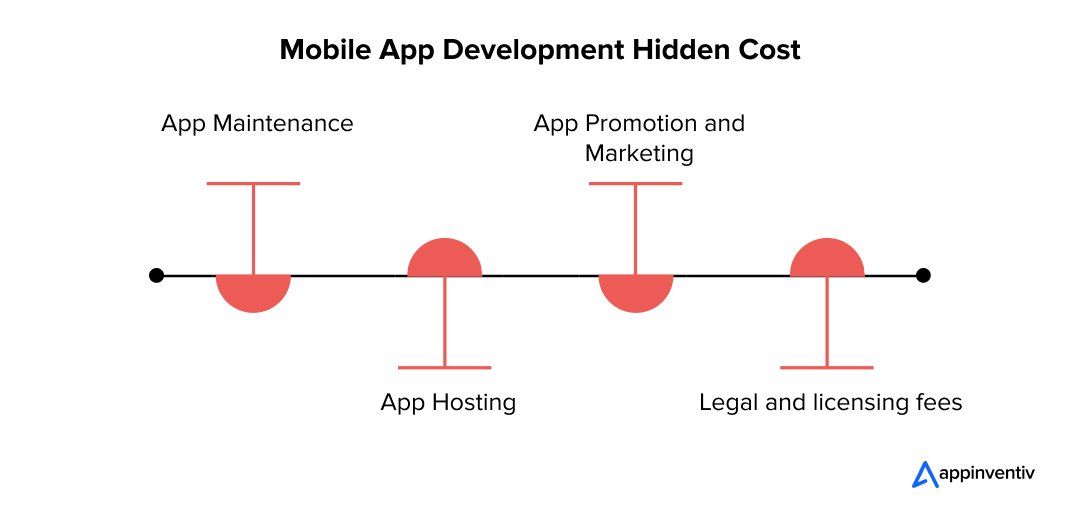
App Maintenance
Maintenance costs include regular updates, bug fixes, and compatibility upgrades to ensure smooth functionality. Apps also require performance monitoring and user feedback integration, making maintenance a recurring expense.
Things to be Take Care Of:
- Regular updates and patches are needed to keep the app secure and functional and save app development rates.
- Continuous bug fixes to address user-reported issues promptly, impacts the costs of developing a mobile app in Germany.
- Compatibility upgrades for new OS releases and device updates when you prioritize Germany app development budget.
- Performance monitoring to optimize speed and efficiency by reducing mobile app development costs in Germany
App Hosting
Hosting costs depend on the amount of data your app processes and stores. Often preferred in Germany, cloud computing services offer scalability but have recurring fees based on usage and storage requirements.
Things to Take Care Of:
- Choosing the right hosting service (cloud or dedicated servers) that aligns with your needs and saves mobile app development cost in Germany.
- Evaluating scalability options to handle growing data storage and processing requirements.
- Monitoring hosting uptime and load balancing to ensure uninterrupted performance to save costs of developing a mobile app in Germany.
- Considering backup and disaster recovery solutions for data protection, assist in saving app development rates.
- Calculating storage and bandwidth costs to manage ongoing expenses.
App Promotion and Marketing
Effective promotion involves expenses for digital advertising, social media campaigns, and app store optimization. Reaching Germany’s tech-savvy audience often requires investing in localized marketing strategies for better engagement.
Things to Take Care Of:
- Investing in targeted digital advertising campaigns across multiple platforms.
- Running social media campaigns tailored to engage Germany’s tech-savvy audience.
- Implementing effective App Store Optimization (ASO) techniques to improve discoverability.
- Localizing content, visuals, and messaging to resonate with the German audience.
- Collaborating with influencers and media outlets popular in the German tech scene.
Legal and Licensing Fees
Apps in Germany must comply with GDPR and other regulations, requiring legal consultations and compliance measures. Additionally, licensing fees for third-party tools or APIs can increase costs, especially for feature-rich applications.
Things to Take Care Of:
- Adhering to GDPR guidelines to ensure data privacy and protection compliance.
- Consulting with legal experts familiar with European and German tech laws to reduce mobile app development costs in Germany.
- Implementing secure data storage and encryption practices to meet compliance standards.
- Paying licensing fees for third-party tools, software, and APIs integrated into the app saves app development pricing.

Cost Optimization Strategies to Build A Mobile App in Germany
Let’s explore the cost optimization strategies that can help enterprises to build a mobile app in Germany efficiently. By leveraging smart planning, choosing the right technologies, and optimizing the development process, companies can achieve significant cost savings without compromising quality.
Developing an MVP
Start with a Minimum Viable Product (MVP) to launch your app quickly and test its core functionalities in the market. This approach not only saves costs of developing a mobile app in Germany but also allows you to gather valuable user feedback for future enhancements, ensuring a better return on investment.
Prioritizing Necessary Features
Avoid feature overload by identifying and prioritizing the most critical functionalities. Focusing on what truly matters to your users allows you to streamline development and allocate resources more effectively, resulting in a leaner, more impactful app.
Leveraging Cross-Platform Development
Opt for cross-platform frameworks like Flutter or React Native to create an app that works seamlessly on iOS and Android. This strategy reduces the need for separate development teams and ensures faster time-to-market and easier platform updates.
Outsourcing to Cost-Effective Regions
Consider outsourcing development to regions offering skilled talent at competitive rates. Collaborating with experts in these markets lets you maintain high-quality standards while benefiting by minimizing mobile app development cost in Germany.
Monetization Model of a Mobile App in Germany
Let’s explore how businesses in Germany maximize revenue through various approaches. Success often comes from aligning user engagement with value-driven solutions and continuous offerings. The right approach ensures long-term profitability and a loyal customer base by saving the German app development budget.
In-App Purchases
This model allows users to access additional features, virtual goods, or upgrades directly within the app. It works well for apps like games, e-commerce, or fitness trackers where users are willing to pay for personalized experiences. In Germany, this model thrives, as users value convenience and targeted offerings over general features.
Freemium Model
The app is free to download, providing basic functionality while offering advanced features or content at a premium. This approach appeals to users who want to explore the app before committing financially. Many German users appreciate this transparent model, as it provides flexibility in choosing services that meet their needs.
Advertising
Apps generate revenue by displaying ads such as banners, videos, or native ads to users. This model is effective for apps with a large, active user base. However, in Germany, ads must be relevant and non-intrusive to align with user preferences, as overly aggressive advertising can lead to user churn.
Subscription Services
Users pay regularly (weekly, monthly, or annually) to access premium content or services. This model is ideal for streaming, educational, and productivity apps. In Germany, subscription-based apps are popular due to the predictable costs and high-quality services they often provide.
Paid Downloads
Users pay a one-time fee to download the app, commonly seen with niche or high-value apps. This model works best when the app offers unique, exclusive features. In Germany, where quality often precedes cost, this model can succeed if the app’s value proposition is clear and compelling.
How to Build A Mobile App in Germany
Building a successful mobile app in Germany requires a structured approach, starting with clearly understanding your app’s purpose and target audience. It involves creating a seamless user experience, ensuring robust development, and prioritizing performance and security. Let’s explore the step-by-step guide to achieve a smooth and efficient development process.
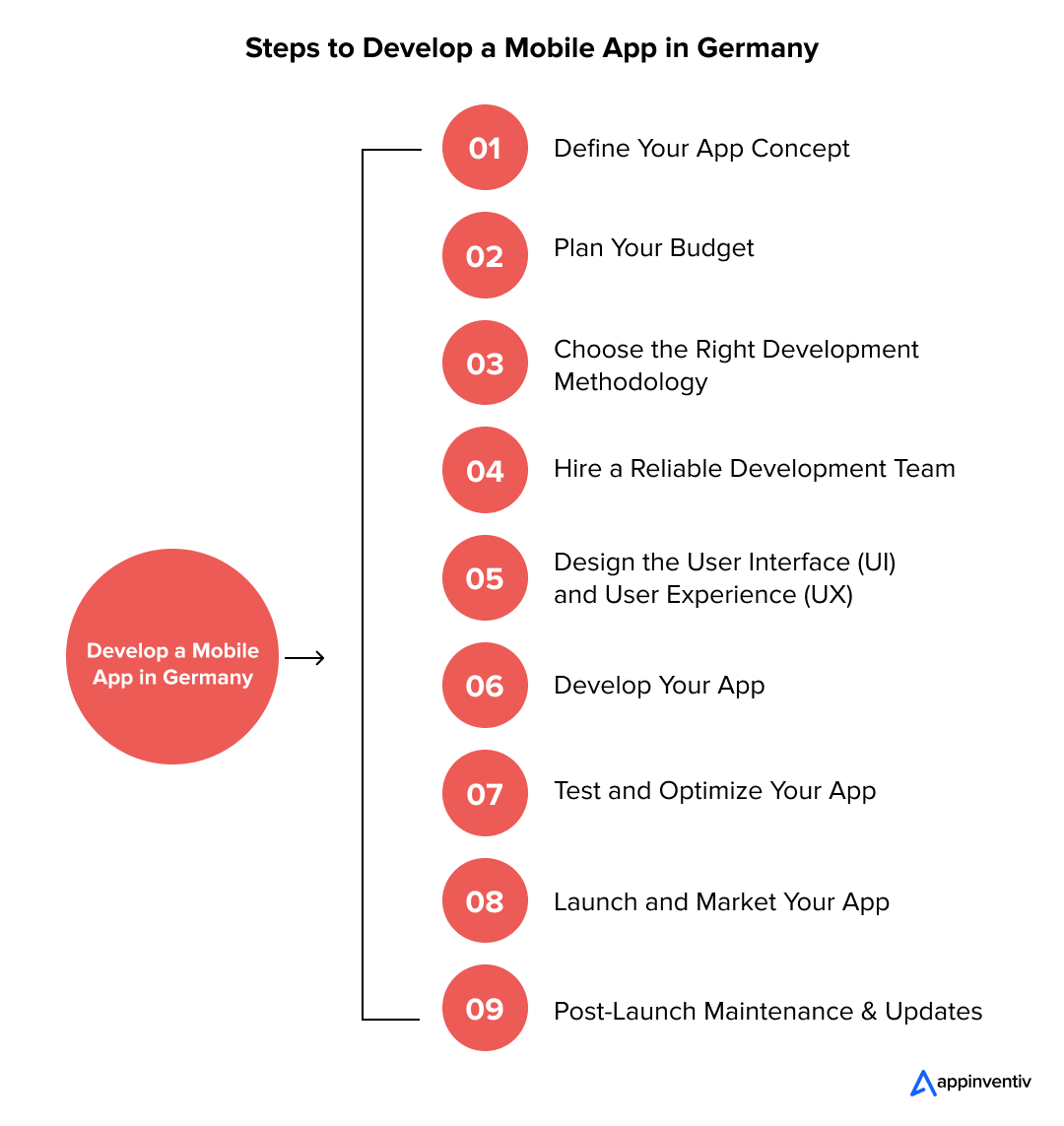
Define Your App Concept
The first step in building a mobile app is clearly defining your app’s purpose and target audience. Identify the specific problem your app solves and how it adds value to users in Germany. Conduct thorough market research to understand your competitors and user preferences, ensuring your app offers unique, attractive features.
Create a detailed list of essential functionalities and prioritize user experience to establish a strong foundation for development by saving mobile app development pricing in Germany.
Plan Your Budget
Budgeting is critical to ensuring the smooth execution of your app project. The costs of developing a mobile app in Germany vary depending on the app’s complexity and features, so outline your expenses carefully.
Factor in localization costs to adapt your app to German cultural and language needs. Additionally, account for legal and compliance-related expenses, especially for adhering to GDPR and other regional regulations.
Choose the Right Development Methodology
Selecting the right development approach significantly impacts your app’s success. For performance-intensive apps, opt for native development using Swift (iOS) and Kotlin (Android). To save costs and time, cross-platform frameworks like Flutter or React Native should be considered.
Each methodology has pros and cons, so choose the one that aligns with your project’s goals and budget to minimize mobile app development pricing in Germany.
Hire a Reliable Development Team
The expertise of your development team can make or break your app project. If you have a long-term vision and budget, an in-house team ensures better control and collaboration.
Alternatively, outsourcing to a mobile app development company in Germany or globally, such as Appinventiv, can bring specialized skills and experience. Freelancers are also an option but may require extra effort for project management and quality assurance.
Design the User Interface (UI) and User Experience (UX)
A visually appealing and user-friendly design is essential to attract and retain users. Focus on clean, intuitive navigation that aligns with German design aesthetics. Prioritize accessibility to make your app usable for a wider audience. Collaborate with designers who understand local trends and user behavior to deliver a seamless and engaging user experience.
Develop Your App
The development phase involves creating the front end, backend and integrating essential features. Choose scalable solutions such as cloud infrastructure to handle growing user demands. Consider options popular in Germany, like Sofort, PayPal, or Stripe, for payment integration.
Continuous testing throughout development ensures a robust and bug-free application by saving the cost to develop a mobile app in Germany.
Test and Optimize Your App
Testing is crucial to ensure your app performs seamlessly under real-world conditions. Conduct thorough testing with a local audience in Germany to gather valuable feedback. Optimize design elements, workflows, and features based on user input to ensure the best value for the cost to develop a mobile app in Germany.
Compliance testing is also necessary to ensure adherence to German and EU data protection standards.
Launch and Market Your App
A successful launch requires a strong marketing strategy tailored to the German audience. Optimize your app’s store presence using localized keywords, descriptions, and visuals. Utilize German social media platforms and collaborate with influencers to create buzz. Partner with local tech blogs and media outlets to reach your target users effectively.
Post-Launch Maintenance & Updates
Launching your app is just the beginning; consistent updates and maintenance are vital for long-term success. Regularly release updates to address bugs, improve features, and keep your app relevant. Provide customer support in German to enhance user satisfaction and loyalty. Use analytics tools to monitor user behavior and continuously optimize your app’s performance.

How Appinventiv Can Help You In Building An App in Germany
Selecting the right mobile app development company in Germany can make all the difference in creating cost-effective and top-tier mobile applications. Appinventiv brings a unique combination of expertise, innovation, and affordability, making us a standout choice for a mobile app development company in Germany.
Here’s why partnering with us makes sense for managing your custom app development cost in Germany effectively:
- Efficient Development Process: We follow a structured approach to ensure your mobile app is built efficiently, meeting all quality standards and business goals.
- Skilled Team of 1600+ Experts: Our diverse and experienced team brings knowledge to every project, ensuring reliable and high-quality development.
- Latest Technology Integration: We utilize cutting-edge tools and frameworks to deliver mobile apps that are innovative, fast, and scalable.
- Trends-Driven Solutions: Our development approach aligns your app with current market trends, ensuring it remains relevant and competitive.
- Proven Track Record: With numerous successful projects under our belt, our track record demonstrates our ability to deliver on time. Notable clients include KFC, IKEA, Pizza Hut, Domino’s, Adidas, and more. We have also helped startups like JobGet, EdFundo, Vyrb, and more achieve significant funding success.
- Tailored Research Approach: We conduct comprehensive research to understand your audience and business needs, delivering custom solutions that drive real impact.
Partner with Appinventiv to experience unmatched expertise and excellence in mobile app development.
FAQs
Q. What is the Average Cost of Mobile App Development in Germany?
A. The average mobile app development cost in Germany typically ranges from $40,000 to $300,000 (approximately €37,000 to €280,000). However, the final cost depends on factors like the app’s complexity, design requirements, features, and the technology stack used.
Q. What factors affect the cost of mobile app development in Germany?
A. Here are the crucial factors that influence mobile app development cost in Germany.
- App Complexity: Simple to advanced functionality.
- UI/UX Design: Customized designs cost more.
- Technology Stack: iOS, Android, or cross-platform choices.
- Team Expertise: In-house, agencies, or freelancers.
- Project Duration: Longer projects cost more.
- Location: Higher local labor costs in Germany.
Q. What are the advantages of developing a mobile app in Germany?
A. Developing a mobile app in Germany offers numerous advantages, making it an attractive choice for businesses. The country is known for its high development standards, ensuring robust and reliable app performance. Germany boasts a skilled IT workforce of experienced professionals who bring expertise to every project.
Adhering to strict data protection regulations like GDPR, hire app developers to prioritize data security and privacy. The availability of advanced technological infrastructure and a culture of innovation and research further support the development process.
Product Development & Engineering
IT Managed & Outsourcing
Consulting Services
Data Services
Didn't find what you're looking for? Let us know your needs, and we'll tailor a solution just for you.